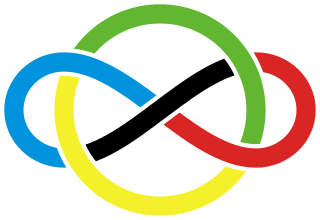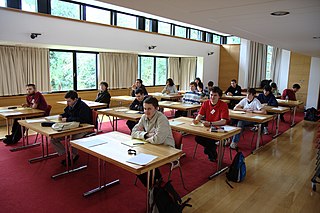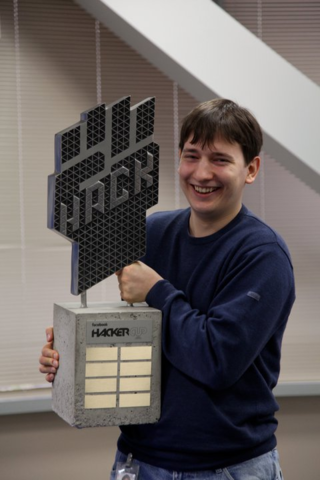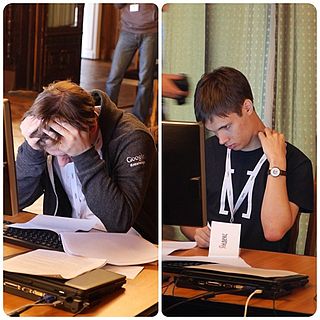
The International Olympiad in Informatics (IOI) is an annual competitive programming competition and one of the International Science Olympiads for secondary school students. The first IOI was held in 1989 in Pravetz, Bulgaria. It is the second largest science olympiad, after the International Mathematical Olympiad, in terms of number of participating countries. Each country sends a team of up to four students, plus one team leader, one deputy leader, and guests.

The International Mathematical Olympiad (IMO) is a mathematical olympiad for pre-university students, and is the oldest of the International Science Olympiads. It is “the most prestigious” mathematical competition in the world. The first IMO was held in Romania in 1959. It has since been held annually, except in 1980. More than 100 countries participate. Each country sends a team of up to six students, plus one team leader, one deputy leader, and observers.
Hong Kong Olympiad in Informatics is an annual programming competition for secondary school students in Hong Kong, emphasizing on problem solving techniques and programming skills. It is co-organized by the Hong Kong Association for Computer Education (HKACE) and the Hong Kong Education Bureau (EDB). It serves as a preliminary contest to international, national and regional competitions such as the China National Olympiad in Informatics (NOI) and the International Olympiad in Informatics (IOI). The first HKOI was held in 1997.
The Canadian Computing Competition (CCC) is an annual programming competition for secondary school students in Canada, organized by the Centre for Education in Mathematics and Computing at the University of Waterloo. Stage 1 is written at high schools and can be written in the programming language of the students' choice, with only a few, such as Maple and Mathematica, disallowed. There are two levels of problems presented, Junior and Senior. The top 20 students in the Senior division are invited to the University of Waterloo to participate in Stage 2, the Canadian Computing Olympiad (CCO). CCO participants are restricted to languages permitted at the IOI, which currently includes only Java, C and C++.. The CCO is used to select students to represent Canada at the IOI.
The United States of America Mathematical Olympiad (USAMO) is a highly selective high school mathematics competition held annually in the United States. Since its debut in 1972, it has served as the final round of the American Mathematics Competitions. In 2010, it split into the USAMO and the United States of America Junior Mathematical Olympiad (USAJMO).
The Central European Olympiad in Informatics (CEOI) is an annual informatics competition for secondary school students. Each of the participating central European countries (plus one or two guest countries, and a local team from the host area) sends a team of up to four contestants, a team leader and a deputy team leader. The contestants compete individually, i.e. a team score is not calculated. Competitors are selected through national competitive programming contests.

Woburn Collegiate Institute is a semestered, English-language public secondary school on Ellesmere Road in the Woburn neighbourhood of the Scarborough district of Toronto, Ontario, Canada operated by the Toronto District School Board. From its inception in 1963 until 1998, it was operated by the Scarborough Board of Education.
The Mathematical Olympiad Program is an intensive summer program held at Carnegie Mellon University. The main purpose of MOP, held since 1974, is to select and train the six members of the U.S. team for the International Mathematical Olympiad (IMO).

The British Informatics Olympiad (BIO) is an annual computer-programming competition for secondary and sixth-form students. Any student under 19 who is in full-time pre-university education and resident in mainland Britain is eligible to compete. The competition is composed of two rounds - a preliminary 3-question, 3-hour exam paper sat at the participant's school and a final round. The top-15 performing students each year are invited to the finals where they attempt to solve several more difficult problems, some written, some involving programming. Typically a score of 75 to 90 out of 100 is required on the first round of the competition to reach the final.
The South African Computing Olympiad (SACO) is an annual computer programming competition for secondary school students in South Africa. The South African team for the International Olympiad in Informatics is selected through it.
The Indian Computing Olympiad is an annual computer programming competition that selects four participants to represent India at the International Olympiad in Informatics. ICO is conducted by the Indian Association for Research in Computing Science. The competition is held in three stages. For the first stage, students may compete in the Zonal Computing Olympiad, or the Zonal Informatics Olympiad. The following two rounds are the Indian National Olympiad in Informatics and the International Olympiad in Informatics Training Camp.
This article describes the selection process, by country, for entrance into the International Mathematical Olympiad.
The Turkish Informatics Olympiad is an annual programming contest organized by the Scientific and Technological Research Council of Turkey (TUBITAK) since 1993. The contest consists of two main parts, and as a result of these two, national medals are given to winners. Four of the medal winners, after a training camp and some tests, establish the Turkish National Team for participation in IOI.
The Canadian Open Mathematics Challenge (COMC) is an annual mathematics competition held in Canada during the month of October. This competition is run by the Canadian Mathematical Society. Students who score exceptionally well on this competition are selected to participate in the Canadian Mathematical Olympiad.
The North American Computational Linguistics Open competition (NACLO), formerly called the North American Computational Linguistics Olympiad before January 1, 2020, is a computational linguistics competition for high school students in the United States and Canada that has been held since 2007. For the 2021 Open competition, approximately 1300 to 1400 students competed. Since 2008 the contest has consisted of two rounds, the second being administered to the top scorers in the first round. The top-scoring students on the second round qualify for the International Linguistics Olympiad (IOL), one of the international science olympiads.

Petr Mitrichev is a Russian competitive programmer who has won multiple major international competitions. His accomplishments include gold and silver (2001) medals in the IOI, gold medals in the ACM ICPC World Finals as part of the team of Moscow State University and winning Google Code Jam (2006), the Topcoder Open, the Topcoder Collegiate Challenge, Facebook Hacker Cup as well as numerous national and online contests. He has achieved the highest rating ever among the Algorithm competitors of Topcoder and consistently ranks in the top two of the world. He is the second highest rated Algorithm coder on Topcoder ratings as of February 2021. He currently works at Google on the search engine and helps to prepare Code Jam.

Competitive programming or sport programming is a mind sport involving participants trying to program according to provided specifications. The contests are usually held over the Internet or a local network. Competitive programming is recognized and supported by several multinational software and Internet companies, such as Google and Meta.
The European Girls' Mathematical Olympiad (EGMO) is a mathematical olympiad for girls which started in 2012, and is held in April each year. It was inspired by the China Girls Mathematical Olympiad (CGMO). Although the competition is held in Europe, it is open to female participants from all over the world, and is considered the most prestigious mathematics competition for girls. In recent years, participants from around 55 countries have been invited to the competition.
The United Kingdom Linguistics Olympiad (UKLO) is a linguistics competition for primary and secondary school students in the United Kingdom. The competition is divided into four levels: Breakthrough, Foundation, Intermediate and Advanced, collectively known as 'Round 1', with the top-scoring 5% of entrants at Advanced level eligible for a follow-on round, called 'Round 2' and selection for participation in the International Linguistics Olympiad, one of the international science olympiads. In 2009, teams from two schools competed in a pilot competition, with the winners taking part in the international contest as guests of the All-Ireland Linguistics Olympiad. In 2010, an independent olympiad was created and has taken place every year since.
Codeforces is a website that hosts competitive programming contests. It is maintained by a group of competitive programmers from ITMO University led by Mikhail Mirzayanov. Since 2013, Codeforces claims to surpass Topcoder in terms of active contestants. As of 2019, it has over 600,000 registered users. Codeforces along with other similar websites are used by some sport programmers, like Gennady Korotkevich, Petr Mitrichev, Benjamin Qi and Makoto Soejima, and by other programmers interested in furthering their careers.





